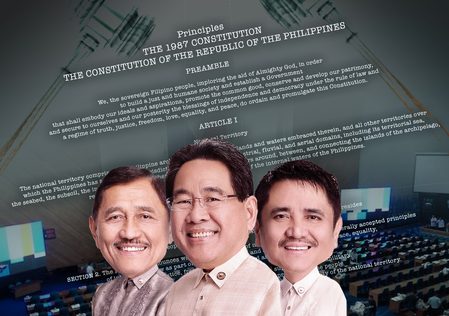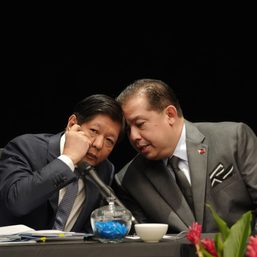SUMMARY
This is AI generated summarization, which may have errors. For context, always refer to the full article.

MANILA, Philippines – The House of Representatives’ constitutional amendments panel convened only for the second time under the 19th Congress on Thursday, January 26, to zero in on numerous proposals seeking to amend or revise the 1987 Constitution.
Economic experts and other analysts took the spotlight in the latter half of the six-hour marathon hearing, providing inputs on at least two bills that seek to relax the charter’s economic provisions.
The measures filed by congressmen Lord Allan Velasco and Gus Tambunting specifically seek to include the phrase “unless otherwise provided by law” in some of the provisions in a bid to entice more foreign investors to come to the Philippines.
So, what was the advice of the invited resource speakers?
Winnie Monsod

Former socio-economic planning chief Winnie Monsod is adamant against an economic charter change, saying she has not seen compelling evidence-based arguments in its favor.
Proponents have said that easing restrictions would result in more foreign direct investments (FDIs), but Monsod insisted that FDIs “most often found to have a positive relationship with growth and development,” such as those aimed at firms producing manufactured exports, are not restricted by the Constitution.
“The evidence, from studies conducted both abroad and domestically, do not support the underlying assumption that FDI will lead to growth and other ‘goodies,'” added Monsod, a professor emeritus of the University of the Philippines (UP) School of Economics.
Monsod also argued that amending the Constitution is not a necessary condition to attract FDIs, adding that it may just incur additional costs to the Philippine government.
Sonny Africa

Picking up from where Monsod left off, IBON Foundation executive director Sonny Africa pointed out that FDIs have been increasing in the Philippines, “the first wave in the 1990s, and the next wave in the 2010s.”
“We do think that foreign investments can be a tool for development. We disagree there are binding constraints. We would argue that after 40 years of liberalization, they’re among the last regulatory tools we have to hold on,” he said.
IBON Foundation is a research outfit that releases studies on economic and social issues.
“It should be striking to many that the Philippines now has more foreign investment in absolute terms, and has a share of GDP higher than Taiwan, South Korea, and China in their respective periods of economic takeoff,” he added, comparing the Philippines to more developed countries.
Raul Fabella

National scientist Raul Fabella is critical of the 1987 charter, saying it “shows the distrust of its framers on future governments to act wisely.”
He suggested that some provisions be dropped, such as Section 11, Article 12, which states that Filipinos should own not less than 60% of a Philippine business.
“It restricts foreign ownership to 40% capital, thus minority interest. The new PSA [Public Service Act] law has reduced the compass of this restriction, but I think we still need to move further than the law,” he said.
Gerardo Sicat

UP School of Economics professor emeritus Gerardo Sicat is in favor of amending the economic provisions of the Constitution, specifically those that limit the participation of foreign investors.
“In the course of our independence, we did not have sufficient capital, so we gave poor service, and we did not bring in foreign capital because our Constitution prevented this. What happened? We had bad service in electricity, bad service in telephone, bad service in water,” he said.
“If we do not get a major effort to show to the world that we are inviting foreign capital, even the great effort of our president to travel abroad and try to convince big investors to come will always say, ‘What about your Constitution?’” Sicat added.
Calixto Chikiamco
Foundation for Economic Freedom president Calixto Chikiamco also said it’s high time to amend or revise the 1987 Constitution.
“The protectionist economic model it espoused promoted a rent-seeking system which manipulates public policy to increase profits for the few,” he said. “It is not a model that encourages sustainable growth for the economy as a whole. As such, our economy has fallen farther behind its neighboring peers.”
The Foundation for Economic Freedom is a non-profit organization espousing various economic and political concerns.
Margarito Teves

Former finance chief Margarito Teves supports an economic charter change, saying the move would enable the country to attract quality investors.
“With globalization, increase in foreign trade, agreements and large corporations investing overseas, the current restrictive economic provisions are no longer aligned with these trends. These include foreign ownership of land, exploitation of natural resources, or equity in mass media and advertising, education, and the foreign practice of profession,” he said.
What’s next
The UP political science department was also invited to join the panel of economists. Its chairman, Professor Aries Arugay, called on President Ferdinand Marcos Jr. to make clear how he perceives charter change discussions in Congress.
He noted that past administrations since 1986 instituted an executive-driven constitutional revision agenda.
“It is essential that the current executive leadership define where it stands on constitutional revision and the process it envisions as well as identify the responsible authorities who will oversee it,” he said.
House constitutional amendments panel chairman Rufus Rodriguez said Speaker Martin Romualdez, the president’s cousin, is hands off on the current charter change discussions.
“There is no directive. We are independent as a committee, and we will present our findings to the plenary for the discussion of everyone,” he told Rappler after the hearing.
“The discussions were very fruitful. We will continue two weeks from now. We want to hear as much as possible everyone who has something to contribute. We intend to have seven consultations,” he added.
– Rappler.com
Add a comment
How does this make you feel?






There are no comments yet. Add your comment to start the conversation.